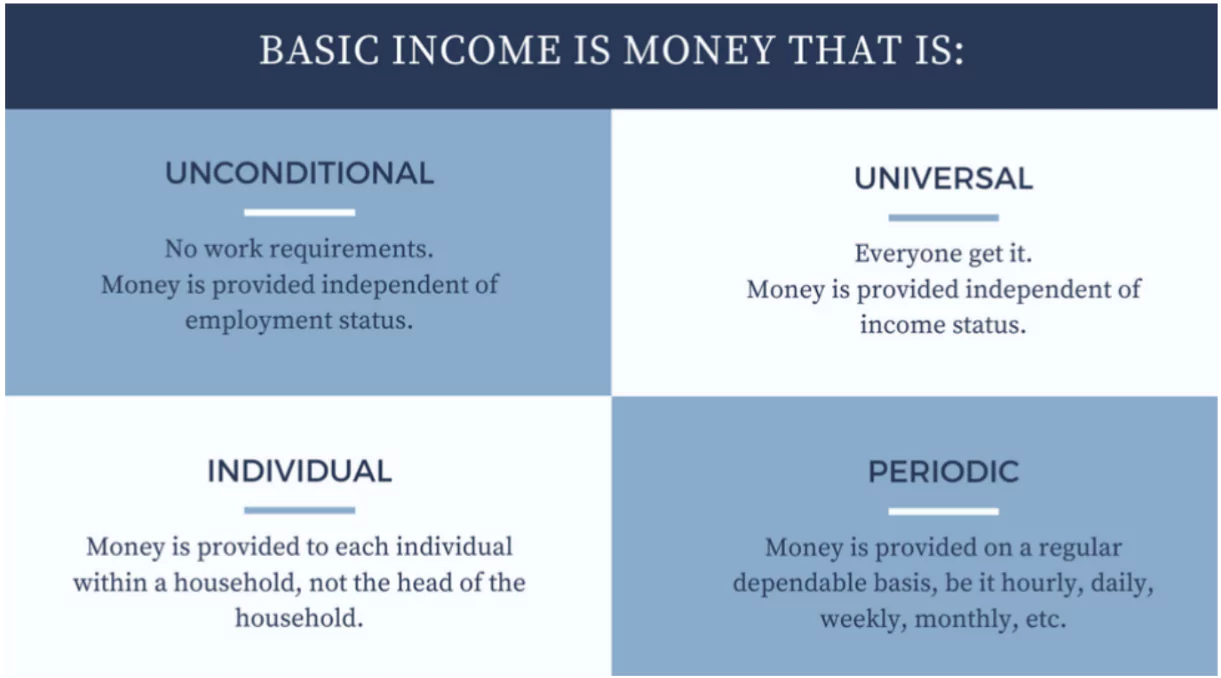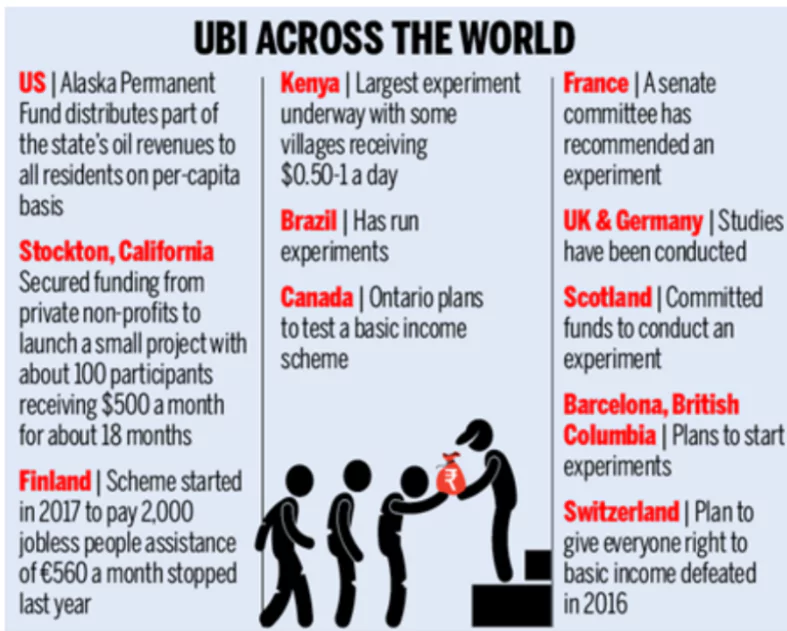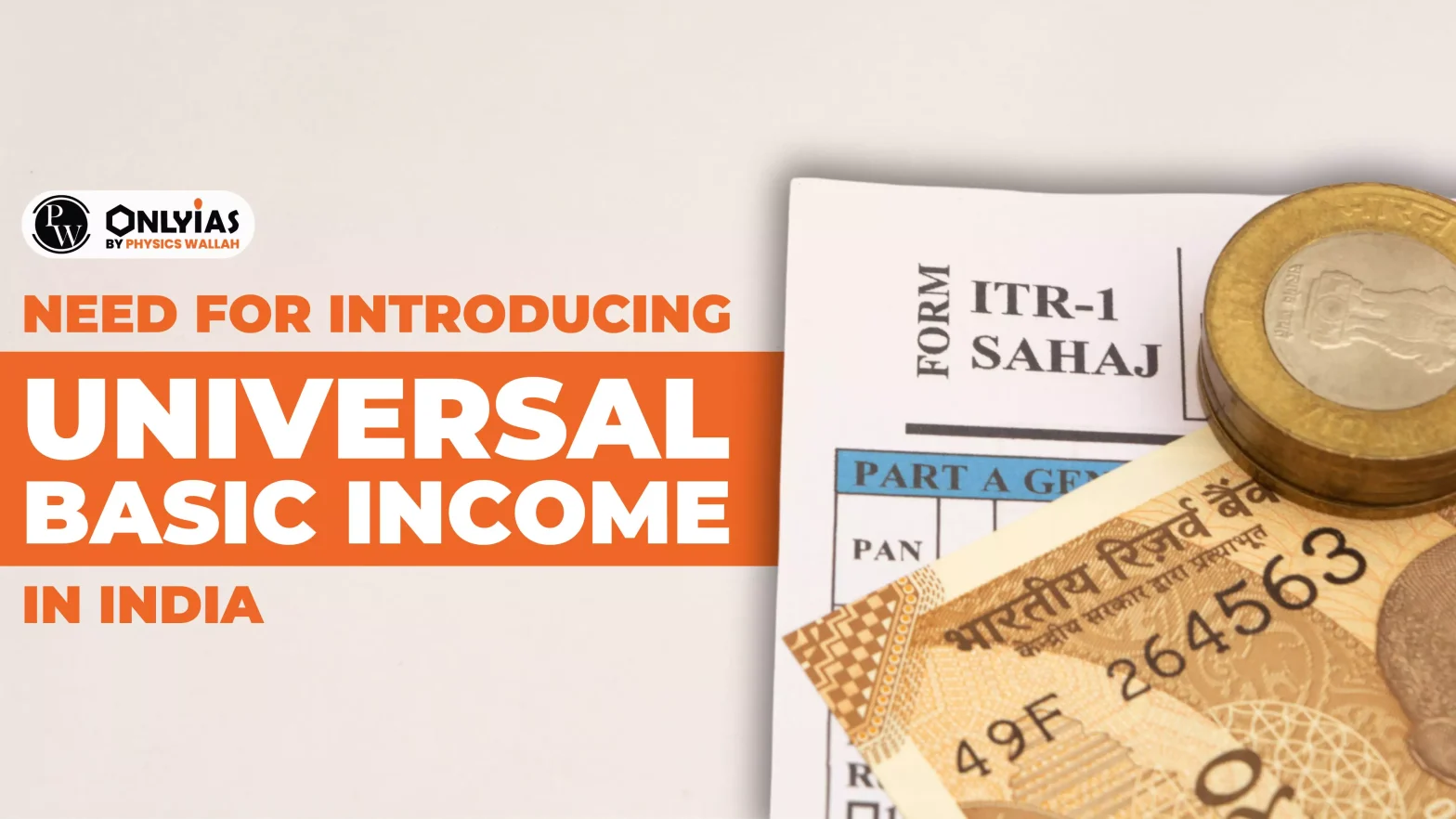The idea of a universal basic income has gained traction since the International Labour Organization’s latest World Employment and Social Outlook report links job growth decline and rising inequality to increased automation and AI.
Major Reasons behind Universal Basic Income Gaining Popularity in India
- Budget 2024: Increased capital investment is directed towards capital-intensive sectors (e.g., railways, highways, power).
- The massive impetus on capex expenditure outlay of Rs 11.11 lakh crore shows government’s focus on boosting investment activity.
- Impact on Employment: Capital-intensive projects like railway corridors and highway construction provide limited direct employment.
- Modern construction techniques reduce the number of jobs created compared to traditional methods.
- E-commerce Impact: E-commerce growth is displacing neighborhood stores, impacting employment in the trade sector.
- Job-Loss Growth: The shift from jobless growth to job-loss growth means displaced workers struggle to find new employment, leading to increased self-employment at low income levels.
- Existing Programs: India has implemented various UBI-like schemes, including cash transfers for farmers, women, and unemployed youth.
- These programs are forms of semi-UBI rather than universal.
Enroll now for UPSC Online Course
About Universal Basic Income (UBI)
- Universal Basic Income (UBI): It is a socio-economic policy where all citizens receive a regular, unconditional sum of money from the government, regardless of their employment status or income.
- Aim: To provide financial security and reduce poverty by ensuring a basic level of income for everyone.
- Key Features:
- Unconditional: UBI is given to everyone without any conditions, such as employment status or wealth.
- Universal: Every citizen is eligible, regardless of their financial background.
- Regular and Recurring: UBI is typically provided on a regular basis, such as monthly or annually.
- Cash Payments: It is paid in cash rather than in-kind benefits (like food or housing assistance), allowing people to decide how to spend the money.

Need for Introducing Universal Basic Income in India
India, with its vast population, income inequality, and large informal economy, could benefit from UBI in multiple ways.
- Reducing Inequality: UBI could help bridge the income gap between the rich and the poor by ensuring that everyone, regardless of their socio-economic status, receives financial support.
- ILO’s World Employment and Social Outlook study highlights that in 2024, almost a third of the world’s young women (28.2%) are not in employment, education or training, it estimates, which is double that of young men (13.1%).
- Safety Net for Workers: Around 80% of India’s labour force is employed in the informal sector, where job security and social benefits are scarce.
- UBI can act as a safety net for workers in the informal economy, providing them with financial stability.
- Inefficient Welfare Programs: India has a complex and fragmented welfare system which often suffer from inefficiency, corruption, and poor targeting.
-
- UBI would simplify the welfare system by providing direct cash transfers to all, eliminating the need for intermediaries and reducing leakage of funds.
- Entrepreneurship and Innovation: By providing a basic income, UBI could empower people to take risks, such as starting a business, pursuing education, or engaging in creative activities, without the fear of falling into poverty.
- Agrarian Distress: UBI could provide a financial buffer to farmers struggling due to low incomes, debt, and crop failures, helping them cope with uncertainties in farming.
- Supporting Women and Vulnerable Groups: UBI could provide women, particularly those in rural and low-income households, with direct cash transfers, helping improve their financial independence and decision-making power.
- Migration and Rural Poverty: UBI could address rural poverty and reduce distress migration from rural areas to urban centers, offering people a basic level of economic security in their home regions.
Implementing a Universal Basic Income (UBI) in India poses several challenges
- High Cost: India has a large population, and providing a basic income to every citizen would require a substantial financial outlay.
- For Example: The Economic Survey of 2016-17 estimated that a UBI of Rs. 7,620 per year for every Indian would cost about 4.9% of GDP.
- Universal vs. Targeted: A universal approach could waste resources on those who don’t need it, while a targeted approach could bring back issues like exclusion errors seen in existing welfare schemes.
- Price Rise: Injecting large amounts of cash into the economy might trigger inflation, especially in food and essential commodities.
- This could negate the positive effects of UBI for the poor, who are most affected by price rises.
- Unequal Access: UBI, if not carefully designed, could fail to address issues of gender inequality.
- Men might have more control over the financial resources, sidelining women in patriarchal households.
- Dependency Risk: There is concern that UBI could create a culture of dependency, where people might rely solely on basic income without striving to improve their economic situation through education or employment.
- Labour Market Distortion: Critics argue that a guaranteed income might reduce the incentive to work, which could affect labor-intensive sectors like agriculture and informal jobs, which make up a significant portion of India’s economy.
Check Out UPSC CSE Books From PW Store
Global Precedents
- Finland: Finland concluded an experiment on UBI’s effects on unemployed citizens, which commenced in January 2017.
- Canada: Earlier, Canada had announced a plan to test a kind of unconditional income guarantee, and enrolled participants in three areas of the province for a guaranteed income for up to three years.
- Netherlands: Some cities in the Netherlands have launched municipal-level trials for UBI.
|
Way Forward for Implementing Universal Basic Income in India
A cautious, phased, and well-planned approach is necessary for successful implementation.

- Localized Experiments: Conducting pilot projects in diverse regions of India, similar to global precedents (e.g., Finland, Canada), can help assess the feasibility of UBI.
- Government should focus on collecting comprehensive data to assess UBI’s effects on poverty reduction, consumption patterns, inflation, and labor participation.
- Targeted Implementation Initially: Instead of introducing UBI universally, the government could start by targeting the most vulnerable populations, such as small farmers, informal workers, women, and marginalized communities.
- This will reduce the fiscal burden while ensuring that those in dire need receive immediate support.
- Rationalize Existing Subsidies: Welfare programs that overlap or serve the same purpose could be streamlined to free up fiscal resources for UBI.
- Tax Reforms: The government could explore new sources of revenue, such as wealth taxes or carbon taxes, to sustainably fund UBI without worsening the fiscal deficit.
- Monetary Policy Coordination: The Reserve Bank of India (RBI) would need to coordinate with the government to manage inflationary pressures that could arise from cash transfers.
- Phasing out the distribution of UBI funds over time, instead of large lump sums, could reduce the immediate risk of inflation, especially in essential goods and services.
- Aadhaar and Direct Benefit Transfers (DBT): India’s existing infrastructure, like Aadhaar and DBT systems, can be strengthened to ensure efficient, transparent, and direct cash transfers to beneficiaries, reducing corruption and leakages.
- Linking UBI with Economic Empowerment: Efforts in the mid-2000s to provide safety nets revealed that giving money without work can lead to societal division and loss of dignity.
- Providing work is crucial to prevent alienation and negative labels for the unemployed.
- This will encourage individuals to use the financial security provided by UBI to pursue education, start businesses, and engage in productive activities.
Enroll now for UPSC Online Classes
Conclusion
By learning from global experiences, leveraging technology, and addressing the unique challenges posed by India’s diverse socio-economic landscape, UBI can be introduced in a way that strengthens the country’s welfare architecture while minimizing risks.
![]() 13 Sep 2024
13 Sep 2024


